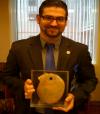Can Key Gaskill Syndrome Affect Humans?

Question: its possible that I have the human form of key gaskill syndrome, where can I find out more about it ?
Brief Answer:
Disease of cats
Detailed Answer:
Dear patient,
Key Gaskell is dysautonomic disease in cats, where the automatic nerves that regulate basic body functions go wrong. It is autosomal dominant. It only affects cats. However, there are many diseases in humans that affect the autonomic system, such as diabetes, Parkinson's, amyloidosis and diverse forms of primary neuropathies.
I urge you to visit: http://www.dysautonomiainternational.org/
If you want to learn more about autonomic dysfunction in humans.
Hope that helps, wish you the best,
Dr Brenes-Salazar MD
Mayo Clinic MN
Disease of cats
Detailed Answer:
Dear patient,
Key Gaskell is dysautonomic disease in cats, where the automatic nerves that regulate basic body functions go wrong. It is autosomal dominant. It only affects cats. However, there are many diseases in humans that affect the autonomic system, such as diabetes, Parkinson's, amyloidosis and diverse forms of primary neuropathies.
I urge you to visit: http://www.dysautonomiainternational.org/
If you want to learn more about autonomic dysfunction in humans.
Hope that helps, wish you the best,
Dr Brenes-Salazar MD
Mayo Clinic MN
Note: For further follow up on related General & Family Physician Click here.
Above answer was peer-reviewed by :
Dr. Chakravarthy Mazumdar

Answered by

Get personalised answers from verified doctor in minutes across 80+ specialties



